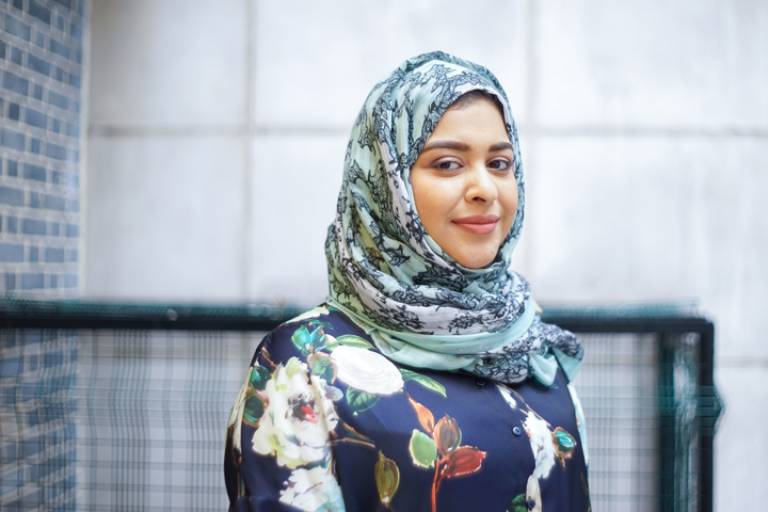People: in focus - Huda Almadhoob, PhD candidate, on her research and moving to London
20 January 2017
PhD candidate Huda Almadhoob speaks to us about her research and the challenging move from Bahrain to London.

After finishing her master's degree in Project and Enterprise Management in 2013, Huda Almadhoob decided to continue her studies at C&PM as a PhD candidate. She spoke to us about her research and the initial difficulty of moving from Bahrain to London.
Why did you decide to study at C&PM?
I was attracted to the School’s reputation and its prominent position among its counterparts in the field. Also, my research is tied directly with the interests and work of my supervisors which has reinforced my decision to continue my journey at C&PM.
What did you enjoy about your masters study?
It was very interesting to hear the academics’ perspectives on various topics and ideas. We had a lot of academics coming from outside the university which added to the breadth of knowledge we were exposed to.
What would you say the largest difference is between master’s study and becoming a PhD candidate? Has it changed the way you relate to staff?
I think it is completely different and it has changed how we relate to the academics. They make us feel that we are in similar circles to them, which is great!
What are you currently researching?
My PhD research project is about establishing a new theoretical framework for managing large construction projects, grounded in complexity theory with reference to social network theory and its analytical techniques. In essence, the research is underlined by the need to move away from the traditional top-down hierarchical and contractually prescribed management approaches to focus on bottom-up approaches. Particularly, the study assumes that “large construction projects to be perceived as complex adaptive systems (CAS) which usually operate at the edge of chaos” and thus has the tendency to self-organise and adapt in a process to balance between order and chaos. This ultimately affects the flexibility and the resilience of project networks.
By taking a CAS perspective and driven by the people-intensive nature of the construction industry, this perspective shifts the unit of analysis from the projects’ economic attributes and organisational effectiveness to examine the relational and social dimensions of projects. Thus, the focus shifts to the micro/individual interpersonal communicative relationships that are the essence of the emergence of self-organising networks. Employing network theory and social network analysis (SNA) as an investigative lens will offer great insights into the operation of project systems.
For my research, the data collected for Knowledge Transfer Partnership (KTP) research project between UCL Centre for Organisational Network Analysis (CONA) and Transport for London (TfL) will be used. Currently, I’m in the process of data analysis and the Bank Station Capacity Upgrade (BSCU) Project has been chosen to be the focus for my research. This data have been gathered longitudinally over a two-years period and thus it provides a platform to understand the evolutionally nature of complex project networks.
What did you do before coming here?
Before starting my PhD, I joined the University of Bahrain in 2010 as a research and teaching assistant after completing my bachelor degree in Architecture. Since 2010, I have lectured on several courses including: Basic Design, Architectural Design, Project Management and Architectural Professional Practice.
How has it been coming to London after living in Bahrain?
It is so different to Bahrain where you have your own house, your car and you can move very easily. You also have your family supporting you. Here, it’s more about trying to support yourself and your family in a different environment. To be frank, it was very challenging at the beginning but, with time, it got easier to settle in.
Finally, what do you enjoy about being a PhD candidate at C&PM?
The experience has been interesting and stimulating due to the vibrant and diverse intellectual atmosphere. It’s always thought-provoking to hear and discuss ideas with fellow PhD students and academics and I look forward to a flourished future for all as we continue to support each other.
 Close
Close

